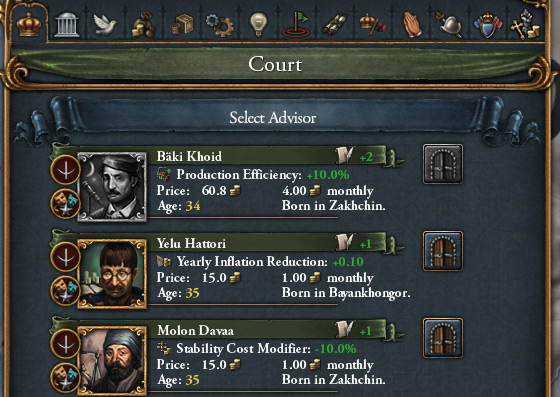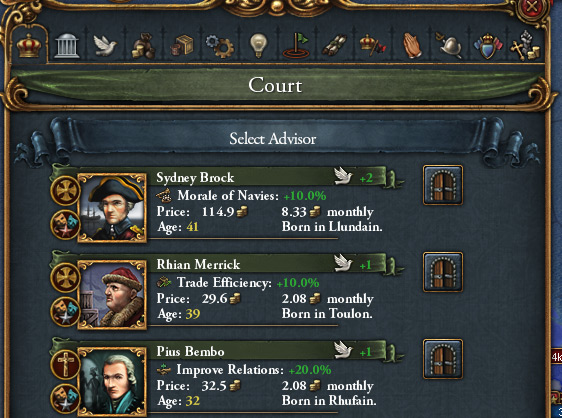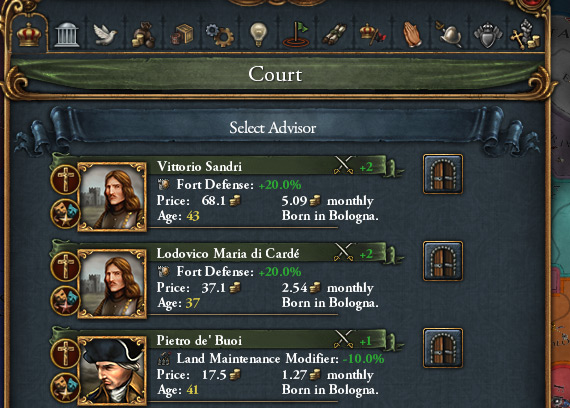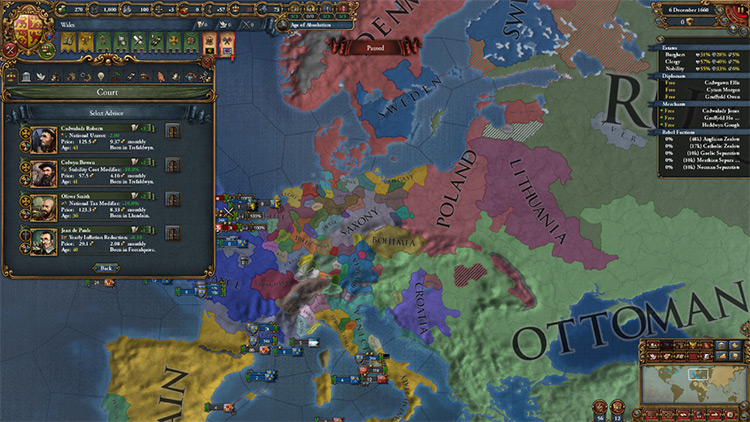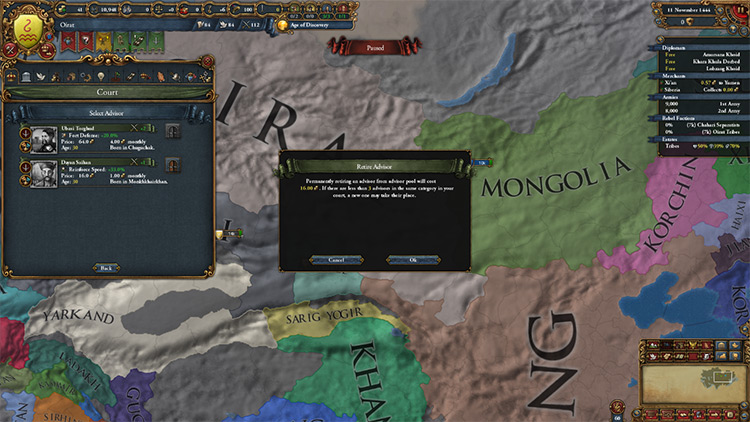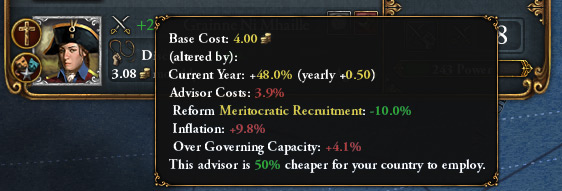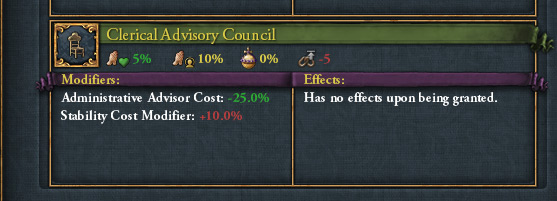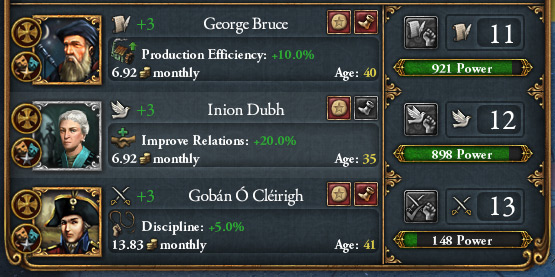A unique modifier depending on their type and area of expertise Increased administrative, diplomatic, and military power (collectively called “Monarch Points”)
Some of the strongest advisors are:
Commandant: Discipline +5% Army Reformer: Morale of Armies +10% Statesman: Diplomatic Reputation +1 Inquisitor: Missionary Strength +2%
These can be vital for a nation. They can help you secure clutch alliances, attain religious unity, and win close wars.
Advisor Types
Advisors are split into 3 categories: administrative, diplomatic, and military. I will list them from best to worst for each separate category depending on their provided bonus. Of course, a higher tier advisor is always preferable if you can afford him, regardless of the provided bonus. Tip: Military advisors should be prioritized early game to ensure you’re ahead, or at least on par, in military tech with your neighbors.
Administrative Advisors
Inquisitor: Missionary strength +2% Only administrative advisor that you need to actively seek during certain stages of the game. The missionary strength he provides is very powerful, especially early in the game when you haven’t raised it through decisions. Philosopher: Yearly prestige +1 Prestige is always welcome. High prestige provides a ton of bonuses. +1 can keep your prestige from decaying. Natural Scientist: Production efficiency +10% Would be bottom of the list in the early game. Late game though, you want to look for this guy as the production efficiency will skyrocket your income. Theologian: National unrest -2% Usually you want to either outright avoid revolts, or have them happen as fast as possible and deal with them. The -2% alone is rarely enough to prevent them outright. If stacked with other unrest modifiers it can be worth it. Master of Mint: Yearly inflation reduction +0.10 Inflation is an economy killer. However, +0.10 is too low to make a difference. It is equivalent to 75 ADM points very 20 years (It costs 75 ADM points to reduce inflation by 2) Artist: Stability cost modifier -10% Useful when you anticipate that you will need to raise stability soon. Treasurer: National tax modifier +10% The amount provided is negligible. Late game the production efficiency is far more useful.
Diplomatic Advisors
Statesman: Diplomatic reputation +1 Allows nations in difficult starting positions to secure alliances. Diplomatic reputation is generally hard to come by and this can be the difference between an ally joining your war or not. It also helps keep vassals loyal. Diplomat: Improve relations +20% Improve relations affects aggressive expansion. Always look for this one when you plan on playing aggressively. Trader: Trade efficiency +10% Late game most of your income will be coming through trade and production. Naval reformer: Morale of navies +10% Sometimes you just need some oomph to help you win naval engagements in a war. Spymaster: Spy network construction +25% Very useful when you need to fabricate claims very quickly at game start. Navigator: Colonial range +20% A very niche pick. If this +20% is enough to reach desirable land and kickstart colonizing, it’s worth it to look for. Colonial governor: Tariffs +10% Usually not worth it over the Trader, even with very big colonial subjects.
Military Advisors
Commandant: Discipline +5% Discipline is the most important military modifier. You should always get it from any source possible. Army Reformer: Morale of armies +10% Early game, it can be argued morale is more useful than discipline. I won’t go into details about how combat works here, but this is for the most part true. It quickly falls behind discipline though. Military Engineer: Fort defense +20% Siege races are a common occurrence throughout the game. You will find yourself trying to siege down enemy forts faster than they can siege yours. This helps ensure your enemies will have to invest a lot of time in each siege. Quartermaster: Reinforce speed +33% Late game wars will see your armies suffering many loses. The faster they can reinforce, the faster you can return them to the action. Master Recruiter: National manpower modifier +10% Manpower is essential when starting a war. Without manpower you will be unable to reinforce your armies. Grand Captain: Land maintenance modifier -10% During peacetime the reduced cost of upkeep for your standing army is always welcome. Army Organizer: Land force limit modifier +10% Force limit isn’t a hard cap. It just raises your army’s upkeep if you go over it. Hence, it’s useless during peacetime. During a war any other advisor provides more useful bonuses.
Potential Advisors
You can only employ one advisor of each type at a time. Only administrative advisor that you need to actively seek during certain stages of the game. The missionary strength he provides is very powerful, especially early in the game when you haven’t raised it through decisions. Prestige is always welcome. High prestige provides a ton of bonuses. +1 can keep your prestige from decaying. Would be bottom of the list in the early game. Late game though, you want to look for this guy as the production efficiency will skyrocket your income. Usually you want to either outright avoid revolts, or have them happen as fast as possible and deal with them. The -2% alone is rarely enough to prevent them outright. If stacked with other unrest modifiers it can be worth it. Inflation is an economy killer. However, +0.10 is too low to make a difference. It is equivalent to 75 ADM points very 20 years (It costs 75 ADM points to reduce inflation by 2) Useful when you anticipate that you will need to raise stability soon. The amount provided is negligible. Late game the production efficiency is far more useful. Allows nations in difficult starting positions to secure alliances. Diplomatic reputation is generally hard to come by and this can be the difference between an ally joining your war or not. It also helps keep vassals loyal. Improve relations affects aggressive expansion. Always look for this one when you plan on playing aggressively. Late game most of your income will be coming through trade and production. Sometimes you just need some oomph to help you win naval engagements in a war. Very useful when you need to fabricate claims very quickly at game start. A very niche pick. If this +20% is enough to reach desirable land and kickstart colonizing, it’s worth it to look for. Usually not worth it over the Trader, even with very big colonial subjects. Discipline is the most important military modifier. You should always get it from any source possible. Early game, it can be argued morale is more useful than discipline. I won’t go into details about how combat works here, but this is for the most part true. It quickly falls behind discipline though. Siege races are a common occurrence throughout the game. You will find yourself trying to siege down enemy forts faster than they can siege yours. This helps ensure your enemies will have to invest a lot of time in each siege. Late game wars will see your armies suffering many loses. The faster they can reinforce, the faster you can return them to the action. Manpower is essential when starting a war. Without manpower you will be unable to reinforce your armies. During peacetime the reduced cost of upkeep for your standing army is always welcome. Force limit isn’t a hard cap. It just raises your army’s upkeep if you go over it. Hence, it’s useless during peacetime. During a war any other advisor provides more useful bonuses. By default, your court has 3 potential candidates for each type (administrative, diplomatic, and military). This is called the advisor pool. This number can be increased by the “possible advisors” modifier (e.g., being the curia controller provides +2 possible advisors). Advisors have 5 tiers. They will appear in your court’s advisor pool up to tier 3 if you have an income of at least +50 ducats, or up to tier 2 otherwise. Advisors instantly fill their type’s “advisor pool” as the existing ones retire (either due to old age, or you force-retiring them). New advisors always appear at least 30 years old and have an increasing chance of retiring after they turn 40. If searching for a particular advisor, just retire the cheaper ones repeatedly until the desired one appears. This is sadly totally random and can easily drive you mad. Most advisors will not live over 60 years old. You should estimate a 20-year employment when hiring an advisor younger than 30.
Half-Price Advisors
These are unique advisors that can bend those rules mentioned above. They will appear anyway in your pool, even if you are seemingly at full capacity. They also usually come with an inherent -50% reduction for their employment and upkeep, which is a huge deal. You should try and employ these guys as much as possible, especially at higher tiers. You can get your hands on such advisors in a multitude of ways:
Through estate agenda rewards Through events Through mission tree rewards At game start, certain nations begin with important historical figures already in their advisor pool
Advisor Hiring Costs and Salary
Each advisor costs a certain amount to hire and needs to be paid a monthly salary to maintain. The base monthly salary is 1, 4, 9, 16, or 25 ducats for each tier respectively. This value globally rises by 0.5 each year that passes. This means that after 200 years, in 1644, advisor costs will have doubled. The hiring cost of each advisor is calculated by the following formula: This means that younger advisors are slightly costlier. Advisor cost reduction can help your Monarch Point generation shoot through the roof by employing higher tier advisors. Factors modifying it are:
Inflation (scaling, up to +100%) Bankruptcy (+100%) Over governing capacity (+100% when governing cost is more than twice the capacity) Meritocracy, unique to the Emperor of China (scaling, from +25% to -25%) Monarchy government reform at Tier 4: Meritocratic recruitment (-10%) Various religion interactions (-10% or -20%) Ruler with “Well Connected” Personality (-20%) Trading in Tea (-10%) Advisors with ruler’s culture when having the Mamluk unique government (-25%) Various National Idea sets (-10% to -25%) Various events and mission rewards Various Great Projects (-15% or -20% at tier 3) Each basic estate can be given a privilege providing a -25% reduction to their respective advisor type, at the expense of +10% stability cost
The maximum discount you can get is -90%. Although, the -50% of discounted Advisors is applied on top of that. This means that the fewer reductions you have, the more important for your treasury it is to look for discounted advisors.
Promoting Advisors
Advisors that belong to an accepted culture and religion can be promoted up to tier 5. This costs 60 times their monthly salary. Promoting an advisor sharply raises their monthly salary, so make sure your economy can handle it. Being one of the very few sources of Monarch Points, high tier advisors should be employed whenever possible. If money is scarce, pinpoint which category should be prioritized and focus on that. Usually, military points are the most important. You should never be behind your neighbors in military tech. Also, each tier 3 or higher advisor employed can trigger a positive event during his lifetime that provides bonuses and prestige depending on his expertise.
